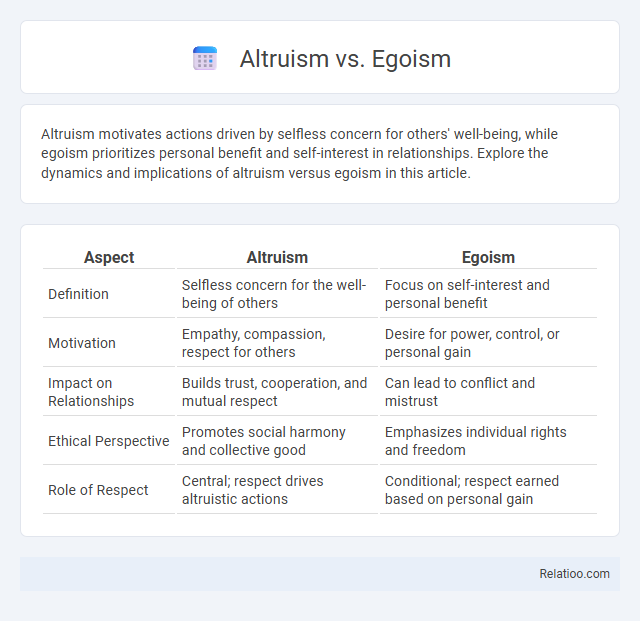Altruism motivates actions driven by selfless concern for others' well-being, while egoism prioritizes personal benefit and self-interest in relationships. Explore the dynamics and implications of altruism versus egoism in this article.
Table of Comparison
| Aspect | Altruism | Egoism |
|---|---|---|
| Definition | Selfless concern for the well-being of others | Focus on self-interest and personal benefit |
| Motivation | Empathy, compassion, respect for others | Desire for power, control, or personal gain |
| Impact on Relationships | Builds trust, cooperation, and mutual respect | Can lead to conflict and mistrust |
| Ethical Perspective | Promotes social harmony and collective good | Emphasizes individual rights and freedom |
| Role of Respect | Central; respect drives altruistic actions | Conditional; respect earned based on personal gain |
Understanding Altruism: Definition and Key Concepts
Understanding altruism involves recognizing it as selfless concern for the well-being of others, contrasting with egoism, which prioritizes personal benefit. Altruism drives prosocial behaviors, such as helping and sharing, without expecting rewards, while egoism is motivated by self-interest and personal gain. Your ability to distinguish between these key concepts enhances empathy and ethical decision-making in social interactions.
Defining Egoism: Philosophical Foundations
Egoism, rooted in philosophical foundations, asserts that individuals act primarily out of self-interest and personal benefit, contrasting sharply with altruism, which emphasizes selfless concern for others. Classical egoism is divided into psychological egoism, the descriptive claim that people naturally act in their own interest, and ethical egoism, the normative belief that individuals ought to prioritize their own welfare. This philosophical stance challenges altruism by framing self-interest as a fundamental driver of human motivation and ethical decision-making.
The Psychology Behind Altruistic Behavior
The psychology behind altruistic behavior explores the motivations and cognitive mechanisms driving individuals to act selflessly for the benefit of others, contrasting with egoism which prioritizes self-interest. Research suggests that altruism may arise from empathy, evolutionary advantages, and social conditioning, while egoism stems from personal gain and survival instincts. Understanding these behavioral paradigms aids in dissecting complex human social interactions and moral decision-making.
Types and Forms of Egoism
Egoism primarily manifests in three types: psychological egoism, ethical egoism, and rational egoism, each addressing different aspects of self-interest. Psychological egoism posits that humans are inherently motivated by self-benefit, ethical egoism argues that individuals should act in their own best interest morally, while rational egoism emphasizes rational decision-making to maximize personal advantage. Understanding these forms clarifies the contrast with altruism, which prioritizes others' welfare, highlighting the spectrum of human motivation between self-centeredness and selflessness.
Evolutionary Perspectives: Survival and Self-interest
Evolutionary perspectives on altruism and egoism highlight survival and self-interest as key drivers of behavior in social species. Altruism promotes group cohesion and cooperative benefits, increasing the chances of genetic survival through kin selection and reciprocal altruism. Your understanding of these dynamics reveals how self-interest and altruistic actions coexist to enhance evolutionary fitness.
Altruism vs Egoism in Modern Society
Altruism in modern society promotes selfless concern for the well-being of others, often driving charitable acts and community support, while egoism centers on self-interest and personal gain, influencing behaviors in competitive environments like business and politics. Your ethical decisions are frequently shaped by the tension between altruistic values, which emphasize empathy and cooperation, and egoistic motives that prioritize individual success. Understanding this dynamic helps navigate social interactions and fosters a balance between contributing to collective good and pursuing personal goals.
Ethical Implications: Moral Debates and Dilemmas
Altruism emphasizes selfless concern for the well-being of others, raising ethical questions about the moral duty to prioritize others' needs over personal interests. Egoism asserts that individuals should act in their own self-interest, challenging traditional moral frameworks by framing self-benefit as ethically justifiable. The tension between altruism and egoism fuels moral debates regarding the balance between individual rights and collective responsibilities, often leading to dilemmas in determining the most ethical course of action in diverse social contexts.
Real-world Examples: Acts of Altruism and Egoism
Acts of altruism manifest in real-world examples such as volunteer firefighting, where individuals risk their lives to save others without expecting personal gain, and blood donation drives that save countless lives globally. Egoism is exemplified by corporate executives prioritizing profit maximization through aggressive mergers, often at the expense of employee welfare, and social media influencers who curate content primarily for personal fame and financial gain. These contrasting behaviors highlight the impact of altruistic acts fostering community well-being versus egoistic actions driven by self-interest in diverse societal contexts.
The Balance: Can Altruism and Egoism Coexist?
Altruism and egoism represent contrasting motivations, where altruism focuses on selfless concern for others, while egoism centers on self-interest. The balance between these can exist in ethical frameworks like enlightened self-interest, which suggests that pursuing one's own good can coincide with benefiting others. Studies in psychology and behavioral economics reveal that moderate egoism can enhance altruistic behavior by ensuring personal well-being supports sustained generosity.
Future Trends: The Role of Altruism and Egoism in Human Progress
Future trends in human progress indicate a complex interplay between altruism and egoism, where balancing self-interest and collective well-being becomes crucial. Advances in technology and social networks amplify the impact of altruistic actions by enabling large-scale cooperation, while egoistic motivations drive innovation and competition. Understanding how your choices influence both personal gains and societal benefits shapes the future trajectory of ethical and sustainable development.

Infographic: Altruism vs Egoism
 relatioo.com
relatioo.com